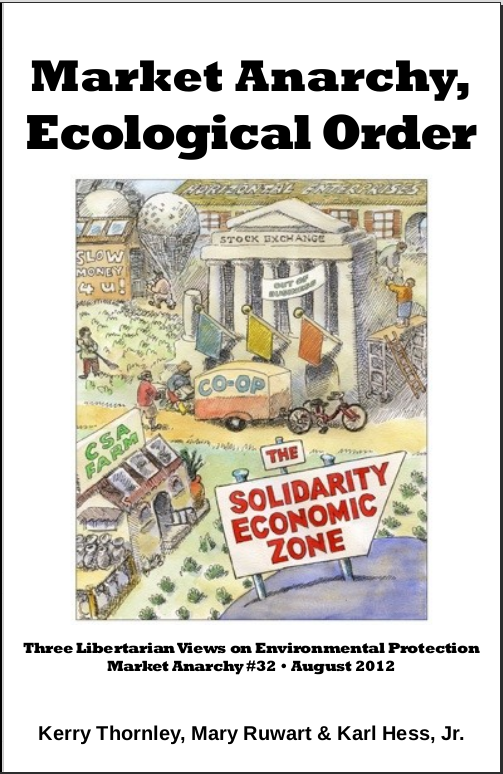C4SS has teamed up with the Distro of the Libertarian Left. The Distro produces and distribute zines and booklets on anarchism, market anarchist theory, counter-economics, and other movements for liberation. For every copy of Kerry Thornley, Mary Ruwart, Karl Hess Jr.’s “Market Anarchy, Ecological Order: Three Libertarian Views on Environmental Protection” that you purchase through the Distro, C4SS will receive a percentage. Support C4SS with Kerry Thornley, Mary Ruwart, Karl Hess Jr.’s “Market Anarchy, Ecological Order: Three Libertarian Views on Environmental Protection“.
$1.00 for the first copy. $0.75 for every additional copy.
This booklet brings together three essays from the left-libertarian tradition on emerging ecological orders and environmental protection in a freed-market society. The first, “A Libertarian Technology of Ecology” was originally published in the Summer 1969 issue of The Innovator: Applications, Experiments, and Developments in Liberty, a radical libertarian newsletter that ran from 1964-1969. The article was signed by “Ho Chi Zen,” a pen name commonly used by Kerry Thornley (1938-1998), a market anarchist author, counterculture publisher, and Nonprophet of Discordianism. The second, “Environmental Destruction” is excerpted and abridged from “Destroying the Environment,” Chapter 8 of Mary Ruwart’s book, Healing Our World in an Age of Aggression (1993). The third, “Deeper Ecology and Deeper Markets” was originally published as “Closing the Green Gap of Market Liberalism,” in The Freeman: Ideas on Liberty (December 1994), by Karl Hess, Jr. (Karl Hess IV), a left-market anarchist, a noted libertarian ecologist and champion of appropriate technology (and son of the ground-breaking left-libertarian radical and political theorist Karl Hess, Sr.).
“Conservation is often considered a statist bugaboo but, in fact, the problem of ecological upset is a real one — made all the more pressing by the fact that statist solutions of increased legal restriction do not work. Those who do the most polluting and destroying also have the most political influence in a society where government and business are interdependent partners. What is needed, instead of more laws cranked out by conditioned reflex, is the same kind of rational, scientific and cybernetic epistemology that is now used in DISCOVERING ecological problems, but not in solving them! Doubtlessly, such spiraling cycles of thought, experimentation, and data collection on the subject would transcend the legalistic, regulatory solutions in short order. . . .” —Kerry Thornley
“While the market of global process and exchange is essential to the wellbeing of society, it is not sufficient for most people’s happiness. The market that matters most to people lies closest to home, the marketplace where people gather to exchange in voluntary fashion everything from cash to good ideas to friendship to mutual aid and cooperation. It is the deep market of community, the cooperative flip side to the market of competition and impersonal economic forces. Therein lies the challenge to both greens and market liberals—how to save the marketplace from both the state and the impersonal market. Free marketeers must look beyond market gimmicks to solve festering environmental problems in a manner still consistent with liberty. The new environmental commons of ecological processes and unbounded communities of plants and animals demand solutions that encompass and yet go beyond ordinary markets and property rights. The environmental commons is a challenge to community—or, in the absence of community, a challenge that will be eagerly taken up by a centralized state in search of an equivalent to militarism. . . .” —Karl Hess, Jr.








